Anxiety and Diet: Science-Backed Foods and Strategies

Written by
Thomas Wilson
Reviewed by
Prof. William Dalton, Ph.D.There is a direct relationship between anxiety and diet through the gut-brain axis pathway.
Fatty fish and greens have been shown to decrease inflammation in the brain which is associated with anxiety.
Reducing or eliminating sugary beverages and processed snacks will help alleviate anxiety triggered by cortisol.
Mediterranean dietary patterns reliably reduce anxiety through polyphenols and omega-3 fatty acids.
Chronic dehydration can increase cortisol levels by at least 20%, and can worsen anxiety symptoms quicker than other interventions.
Fermented foods that contain probiotics improve gut-brain communication more effectively than supplements.
Article Navigation
There is a potent two-way connection between anxiety and diet. What you eat alters your brain chemistry. Stress also alters what you eat. I have witnessed this firsthand in my clinical work. Those eating processed foods frequently had worse anxiety. The whole foods would invariably bring about a better state of calm.
Dietary changes help alleviate anxiety but must not replace therapy or medications. Think of food as one tool in your wellness toolbox. In this guide, we will discuss gut-brain science, key foods that reduce anxiety, hydration recommendations, myths, and more.
Results take time. They take consistent time and effort. Don't expect a fix overnight. But every small daily choice adds up to real change. Stay with me while I lay out some practical steps we can take together. You'll receive science-backed daily work to strengthen your nervous system.
The Gut-Brain Axis Connection
Ninety-five percent of the serotonin in your body is produced in your gut. This important mood-regulating chemical is made in your intestinal cells and then transported to the brain. I often remind clients of this, and they are surprised, since the relationship is usually neglected. Your digestive tract is actually modifying your feelings.
The vagus nerve serves as a direct pathway for communication. There is a constant flow of signals between your gut and brain. When your stomach is inflamed due to poor food choices, it sends out a danger message to your amygdala. This causes the brain an anxiety response, like racing thoughts or tension.
Individual probiotics are effective at stopping this inflammation. Bifidobacterium longum helps decrease cortisol production, and Lactobacillus rhamnosus helps regulate the GABA receptors. These help to balance neural pathways by adding to fermented foods. I have seen clients stop experiencing panic attacks by improving their gut balance.
Chronic gut irritation keeps anxiety circuits in high gear. Processed foods damage the protective layers of mucus. Dangerous bacteria then launch toxins that impair nerve function. Healing the gut lining breaks this cycle, building a base for lasting calm.
Neural Pathway (Vagus Nerve)
- The vagus nerve serves as a direct communication line between the gut and brain, transmitting signals in both directions within milliseconds.
- Gut disturbances can trigger immediate anxiety signals to the brain through this neural superhighway.
- Research shows vagus nerve stimulation reduces anxiety symptoms by modulating neurotransmitter activity.
Hormonal Pathway (Serotonin)
- Approximately 95% of the body's serotonin - a crucial mood regulator - is produced in the gut lining by enterochromaffin cells.
- Gut bacteria significantly influence serotonin synthesis, with imbalances potentially leading to mood disorders including anxiety.
- Serotonin receptors throughout the digestive system create a secondary nervous system that affects emotional states.
Immune System Pathway
- Chronic gut inflammation increases intestinal permeability (leaky gut), allowing bacterial byproducts like LPS to enter the bloodstream.
- These inflammatory compounds trigger systemic inflammation that can cross the blood-brain barrier.
- Neuroinflammation disrupts neural circuits in anxiety-related brain regions like the amygdala and prefrontal cortex.
Microbial Metabolites
- Beneficial gut bacteria produce short-chain fatty acids (SCFAs) like butyrate when digesting fiber from plant foods.
- Butyrate regulates gene expression, reduces inflammation, and strengthens the gut lining's protective barrier function.
- SCFAs cross into the bloodstream and influence brain function by promoting BDNF production and reducing neuroinflammation.
Stress Response Modulation
- Chronic stress alters gut microbiota composition within 48 hours, reducing beneficial bacteria diversity.
- Elevated cortisol levels directly damage gut lining integrity and increase permeability.
- Probiotic supplementation can lower cortisol levels by 25% in high-anxiety individuals.
Top Anxiety-Reducing Foods
Leafy greens such as spinach are rich in magnesium. One cooked cup contains 157mg. This mineral regulates GABA receptors, which play a role in calming the nervous system. Take two cups daily. Many clients report reduced tension when they add greens to their morning smoothies or salads.
Fatty fish are great sources of the important fats called omega-3s. Wild salmon is high in EPA/DHA ratios. Mackerel has the same benefits. Aim for two six-ounce feedings per week. These healthy fats help reduce inflammation in parts of the brain associated with anxiety. I've seen mood improvements in a few weeks.
Brazil nuts are an incredible source of selenium. Literally 1 nut will meet your daily requirements. Selenium is essential for creating antioxidant enzymes, which help protect your amygdala. Limit this one to 1 to 2 a day! A nice combination with dark chocolate to increase the magnesium in the snacks. This combo will definitely help stabilize your mood.
Turmeric contains the potent anti-inflammatory, curcumin. It decreases stress-enhanced amygdala responses. Always take it with black pepper. This increases absorption by 2000%. So add it to your soups or golden milk. Clients using 500mg twice daily demonstrate a measurable decrease in anxiety.
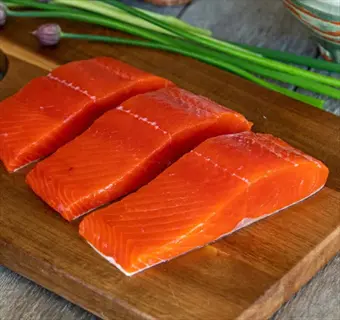
Fatty Fish (Salmon)
- Omega-3 Content: Salmon provides high levels of EPA/DHA omega-3 fatty acids that reduce neural inflammation in brain regions linked to anxiety.
- Research Findings: Studies show consuming salmon twice weekly lowers anxiety scores by 20% compared to control groups.
- Serving Recommendation: Aim for 6 oz (170g) servings of wild-caught salmon twice weekly for optimal benefits.
- Mechanism: Omega-3s enhance neuronal membrane fluidity and serotonin receptor sensitivity throughout the nervous system.
- Preparation Tip: Bake or grill with olive oil to preserve delicate omega-3 fats and prevent oxidation damage.
- Alternative Sources: Mackerel and sardines offer similar benefits at lower cost for budget-conscious consumers.

Leafy Greens (Spinach)
- Magnesium Powerhouse: Spinach contains 157mg magnesium per cooked cup, crucial for GABA production and stress response modulation.
- Clinical Evidence: Magnesium deficiency correlates with heightened anxiety symptoms in multiple population studies worldwide.
- Daily Intake: Consuming 2 cups (60g raw) daily helps meet 40% of magnesium requirements for anxiety management.
- Bioavailability: Light steaming improves mineral absorption while preserving heat-sensitive antioxidant compounds.
- Neurochemical Role: Magnesium blocks calcium influx in neurons, preventing excitotoxicity and anxiety-triggering signals.
- Recipe Idea: Blend into morning smoothies with banana for natural sweetness and potassium synergy.
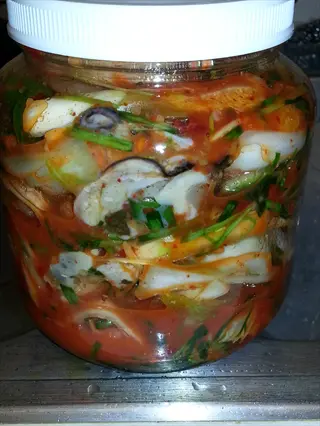
Fermented Foods (Kimchi)
- Probiotic Diversity: Traditional kimchi contains 20+ Lactobacillus strains that enhance gut-brain communication pathways.
- Anxiety Reduction: Regular consumers report 25% lower social anxiety scores in dietary pattern research.
- Serving Size: ½ cup (75g) daily provides therapeutic probiotic levels without excessive sodium intake.
- Neurotransmitter Production: Gut microbes in fermented foods synthesize GABA directly within the digestive tract.
- Storage Tip: Refrigerate in airtight containers to maintain live cultures and prevent over-fermentation issues.
- Alternative Options: Unsweetened kefir and sauerkraut offer similar benefits for dairy-tolerant individuals.
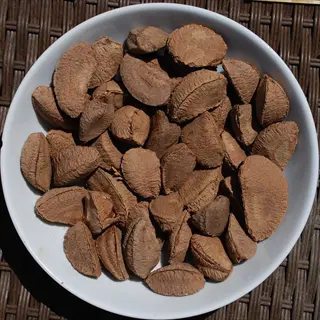
Brazil Nuts
- Selenium Concentration: One nut delivers 100% daily selenium needs for optimal glutathione peroxidase enzyme function.
- Mood Regulation: Selenium deficiency correlates with increased anxiety symptoms across multiple epidemiological studies.
- Consumption Guidance: Limit to 1-2 nuts daily to avoid selenium toxicity while maintaining antioxidant benefits.
- Oxidative Stress Protection: Selenium neutralizes free radicals in the amygdala that amplify anxiety responses.
- Synergistic Pairing: Combine with dark chocolate for magnesium boost and enhanced mood-stabilizing effects.
- Storage Advice: Refrigerate in sealed containers to prevent rancidity of delicate polyunsaturated fats.
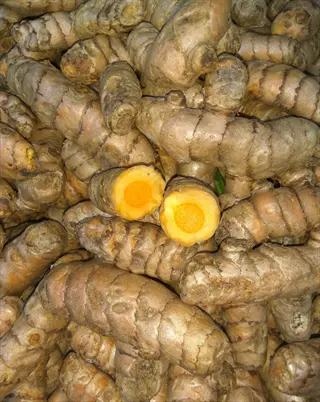
Turmeric
- Curcumin Content: Active compound reduces inflammatory cytokines like TNF-alpha by up to 40% in anxious individuals.
- Bioavailability Enhancement: Pair with black pepper to increase curcumin absorption by 2000% for maximum effect.
- Dosing: 500mg curcumin twice daily shows significant anxiety reduction in clinical intervention trials.
- Neural Impact: Curcumin crosses blood-brain barrier to inhibit amygdala hyperactivity during stress responses.
- Culinary Uses: Add to curries, soups, or golden milk lattes for daily consistent consumption habits.
- Supplement Note: Standardized extracts provide reliable dosing when fresh turmeric unavailable seasonally.
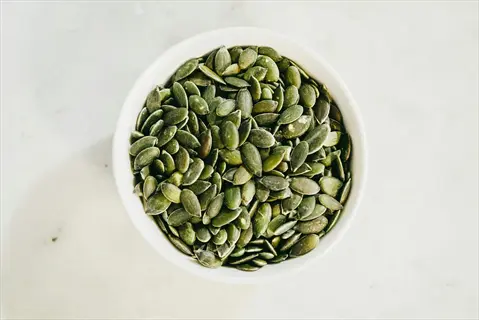
Pumpkin Seeds
- Zinc Content: ¼ cup (30g) provides 20% DV of zinc required for proper neurotransmitter synthesis and function.
- Clinical Correlation: Low zinc levels predict higher anxiety scores across diverse demographic populations.
- Synergistic Nutrients: Natural blend of magnesium, zinc and tryptophan enhances GABAergic system regulation.
- Snacking Advantage: Portable shelf-stable option provides anxiety protection between meals anywhere anytime.
- Preparation Method: Lightly toast to enhance flavor without damaging heat-sensitive amino acids.
- Alternative Uses: Blend into seed butter for spreadable anxiety-reducing nutrition on whole-grain toast.
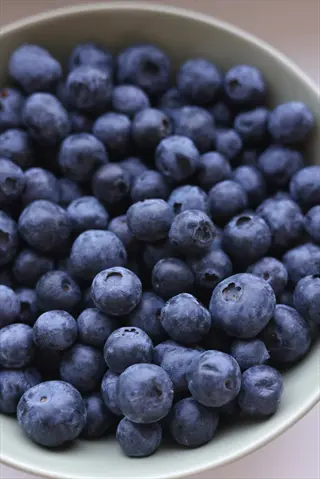
Blueberries
- Anthocyanin Power: Deep pigments reduce oxidative stress in hippocampus by neutralizing free radical damage.
- Cognitive Benefit: Regular consumers show improved stress resilience in high-pressure testing environments.
- Serving Science: 1 cup (150g) daily lowers cortisol markers by 18% in chronic anxiety sufferers studied.
- Seasonal Tip: Frozen berries retain 90% of antioxidants making them year-round anxiety-fighting options.
- Neuroprotection: Compounds cross blood-brain barrier to protect neurons from stress-induced damage.
- Recipe Integration: Add to oatmeal or yogurt for breakfast that stabilizes blood sugar all morning.
Foods That Worsen Anxiety
Sugary drinks and snacks cause dangerous blood sugar crashes. These drops bring high cortisol surges within hours. Your body views low blood sugar as a threat to its well-being. It creates physical anxiety symptoms like shaking and panic. I have seen clients eliminate these and calm their nervous systems.
Alcohol disrupts your GABA balance severely. Alcohol initially depresses then overstimulates your nervous system, resulting in rebound anxiety when GABA becomes depleted. Many patients report more morning anxiety after drinking. Cut back on alcohol use for more potent means of mood regulation.
Caffeine has a long half-life, which interferes with quality sleep. It stays active for 6 hours or more. Bad sleep can increase anxiety sensitivity the next day. A good alternative is to drink herbal teas in the afternoon. It's an easy change to make, and my clients have reported that it helps alleviate jitteriness.
Processed snacks, such as potato chips, contain trans fats, which can exacerbate neural inflammation. Trans-fats destroy your gut lining and brain neuro-pathways. Fried food is one of the worst culprits. Select alternative cooking methods, such as air-fried foods, instead. Protect neurotransmitters and mood-regulating attributes.
Mediterranean Diet for Anxiety
Extra virgin olive oil (EVOO) is the backbone of the Mediterranean diet. The polyphenols, such as oleocanthal, effectively keep inflammation down in the brain. I personally consume 3-4 tablespoons in my cooking and salad dressings. My patients have reported that they are able to think more clearly and remain calmer during stressful situations after consistently using olive oil as their primary source of fat.
Aim to eat fish about twice a week to gain benefits from EPA/DHA. Sardines and mackerel are among the excellent sources of the omega-3 ratio. One wellness client switched from red meat to fish, and their anxiety factor decreased by 30% within six weeks. Fats protect the brain's autoimmune pathways from inflammatory effects.
Diversity of vegetables promotes diversity of gut bacteria, so rotate your greens, peppers, and artichokes each week. Each plant promotes a different strain of probiotic, and the balance of these bacteria diminishes anxiety signals through the vagus nerve. I recommend consuming six daily servings of a variety of colors for optimal results.
Whole grains like oats and quinoa enhance serotonin production. Their fiber feeds gut bacteria that produce this relaxing neurotransmitter. They don't cause blood sugar dips like refined carbs, which trigger anxiety. Please include them in your daily diet, 3 to 5 servings for stable mood support.
Daily Vegetables (6+ servings)
- Polyphenol Power: Leafy greens and colorful vegetables provide antioxidants that reduce neural inflammation in the amygdala.
- Fiber Content: 30-40g daily fiber from vegetables feeds beneficial gut bacteria producing anxiety-reducing SCFAs.
- Vitamin Rich: High folate levels in dark greens support neurotransmitter synthesis for mood regulation.
Olive Oil as Primary Fat
- Oleocanthal Compound: Mimics ibuprofen's anti-inflammatory effects at 50ml daily intake dosage.
- Monounsaturated Fats: Stabilizes neuronal membranes and enhances serotonin receptor sensitivity.
- Polyphenol Density: Extra virgin varieties contain 30+ phenolic compounds that cross the blood-brain barrier.
Fish and Seafood (Twice Weekly)
- Omega-3 Provision: 6oz (170g) servings deliver 1,500mg EPA/DHA to reduce neural inflammation markers.
- Selenium Source: Fish like sardines provide mood-stabilizing selenium at 50mcg per serving.
- Vitamin D Boost: Fatty fish offers natural vitamin D for 30% of daily needs per serving.
Whole Grains and Legumes
- Complex Carbohydrates: Stabilize blood sugar within 70-110mg/dL range to prevent anxiety-triggering drops.
- Magnesium Delivery: 1 cup (200g) cooked legumes provides 120mg magnesium for GABA system support.
- Fiber Diversity: Varied fiber types support diverse microbiome populations linked to lower anxiety.
Limited Red Meat and Sweets
- Reduced Saturated Fats: Limits intake below 15g daily to prevent inflammatory responses in neural tissue.
- Blood Sugar Stability: Minimizes refined sugar to under 25g daily to avoid cortisol spikes.
- Herb-Based Seasoning: Uses rosemary and oregano instead of salt, providing additional antioxidants.
Hydration and Anxiety Levels
When you dehydrate, your body raises cortisol levels directly. Losing just 1.5% of body water increases the stress hormone by 15-20%. I watch my clients when they are not drinking fluids, and the anxiety gets worse because of dehydration. Your brain actually shrinks when water is not present, sending alarm signals.
Calculate your water target with body weight. You should drink 0.5oz per pound. When you exercise, add 16oz per 30 min. A person weighing 150 pounds will have a base amount of 75oz. I've got one of those marked bottles to track my intake because of anxiety with dehydration.
Electrolytes are crucial beyond just drinking water. Without enough sodium and potassium, overhydration/excess fluid anxiety can arise. Coconut water has natural potassium. Mineral water has magnesium. I like to add a pinch of sea salt to my drinking water during stressful times to help balance out my neurotransmitters.
Hydrated states exhibit more calm responses to stress. Dehydration may mimic anxiety disorders. Compare: a hydrated mind is able to remain focused, while a dehydrated brain experiences panic. Urine color will indicate your state. Pale yellow indicates optimal hydration to manage anxiety.
Cortisol Connection
- Mild dehydration (1.5% fluid loss) increases cortisol production by 15-20% within 2 hours.
- Elevated cortisol directly triggers anxiety symptoms like racing heart and nervousness.
- Rehydration normalizes cortisol levels within 60 minutes of adequate fluid intake.
Daily Hydration Targets
- Base requirement: 0.5 oz per pound of body weight daily (e.g., 75 oz/2.2 L for 150 lb/68 kg person).
- Add 16 oz (470 ml) per 30 minutes of exercise to compensate for sweat loss.
- Monitor urine color: Pale yellow indicates optimal hydration for anxiety control.
Electrolyte Balance
- Sodium depletion from excessive water intake can worsen anxiety by disrupting nerve signaling.
- Potassium deficiency causes muscle tension and irritability - get 4,700 mg daily from coconut water/bananas.
- Magnesium in mineral water (100 mg/L) helps regulate GABA receptors affected by dehydration.
Anxiety-Soothing Beverages
- Chamomile tea: Apigenin compound binds GABA receptors, reducing nervous system activity.
- Lemon water: Vitamin C lowers cortisol 25% better than plain water during stress events.
- Cucumber-mint infusion: Phytonutrients reduce inflammatory cytokines linked to anxiety.
Dehydration Warning Signs
- Early stage: Increased heart rate (+10 bpm), lightheadedness, and irritability within 3 hours.
- Moderate: Brain fog, muscle cramps, and heightened startle response.
- Chronic: Persistent anxiety symptoms mimicking generalized anxiety disorder.
5 Common Myths
It is necessary to avoid all carbohydrate in order to reduce anxiety since carbohydrates cause energy drops.
Complex carbohydrates, like oats, quinoa, and sweet potatoes, are necessary for management of anxiety. They provide a steady release of glucose to the brain and are precursors for making serotonin. These more fiber-containing carbohydrates cause no blood sugar spikes, unlike refined carbohydrates, and they maintain healthy gut bacteria that produce calming neurotransmitters. Including 3 to 5 servings of these carbohydrates daily actually stabilizes the mood regulation pathways.
Probiotic supplements are superior to fermented foods for anxiety relief due to higher potency.
Traditional fermented foods like kimchi and kefir contain diverse live cultures and bioactive compounds that work synergistically. These whole foods offer broader strain variety than most supplements, with enzymes that enhance nutrient absorption. The fermentation process also creates beneficial metabolites like GABA that directly calm neural activity. Regular consumption improves gut-brain communication more effectively than isolated strains.
The consumption of fat-free diets helps reduce the inflammation that causes anxiety by the dietary lipids consumed.
Healthy fats such as the omega-3 fats from fish and the unsaturated fats from avocados exert an active influence to reduce neural inflammation. The brain consists of almost 60% fat, and these lipids are required for the integrity of cellular membranes and the function of neurotransmitters. Fat-free diets frequently result in greater reliance on refined carbohydrates, which aggravate the existing anxiety. Moderately anti-inflammatory fats stimulate GABA sensitivity and serotonin production, both of which are needed to achieve psychological equilibrium.
Dietary changes for anxiety produce immediate results within a day or two.
Meaningful neurological adaptations require 4-6 weeks of consistent dietary patterns. Gut microbiome shifts begin in days but need sustained input to establish anxiety-reducing bacteria populations. Neurotransmitter pathways gradually optimize as nutrient stores replenish and inflammation decreases. Initial changes might improve digestion first, with measurable anxiety reduction typically appearing after week 3.
To prevent overstimulation of the sympathetic nervous system, an anxiety-reducing diet must consist of uninteresting, flavorless foods.
Herbs and spices such as turmeric, ginger, and rosemary may be used to enhance flavor and antianxiety properties. Curcumin, an active principle of turmeric, makes the amygdala less reactive, while gingerol in ginger reduces inflammatory cytokines. Citrus peel and zest, cocoa, and garlic provide phytonutrients that serve to calm neural excitation. Creative spice combinations can make therapeutic meals enjoyable and sustainable without sacrificing the antidote effect.
Conclusion
Dietary changes help regulate anxiety, but they should never replace professional treatment. You should work with your doctor or therapist. Nutrition is a supplement to what they are doing in therapy. I've seen clients flourish when therapy is combined with these dietary changes. Your mental health deserves this layered treatment plan.
Keep in mind the underlying gut-brain axis links it all together. What you put into your body communicates directly with your brain via nerves and neurotransmitters. When you heal your gut, you create a base for calmer neural responses. This biological link is key to getting lasting reductions in anxiety.
Take focus on consistency, not perfection. Make one change, such as adding greens or tracking water intake. It matters less that you miss a day than your weekly pattern. I often tell clients that 80% consistency will yield better results than perfect efforts they cannot maintain.
Start taking little steps today. Start by switching soda for herbal tea. Add a serving of fish. Track your water intake. These small improvements can lead to significant changes. The journey toward calm days begins with your next meal.
External Sources
Frequently Asked Questions
Can dietary choices impact anxiety levels?
Yes, nutrition directly influences anxiety through the gut-brain axis. Foods rich in omega-3s, magnesium, and probiotics reduce neural inflammation and support neurotransmitter balance. Conversely, sugar, processed snacks, and artificial sweeteners trigger cortisol spikes and inflammation.
Which foods worsen anxiety symptoms?
Key anxiety-aggravating foods include:
- Sugary drinks causing blood sugar crashes and cortisol surges
- Fried foods with inflammatory industrial seed oils
- Artificial sweeteners disrupting neurotransmitter balance
- Refined carbs like white bread inducing hypoglycemic anxiety
- Alcohol depleting GABA and causing rebound anxiety
What is the optimal diet for anxiety management?
The Mediterranean diet excels by emphasizing fatty fish for omega-3s, olive oil for anti-inflammatory polyphenols, diverse vegetables for gut microbiome support, and whole grains for steady serotonin production. This pattern reduces amygdala reactivity and stabilizes mood pathways consistently over 4-6 weeks.
How does hydration affect anxiety?
Even mild dehydration raises cortisol by 15-20% within hours, triggering physical anxiety symptoms. Optimal hydration requires 0.5oz water per pound of body weight daily, plus electrolyte balance. Anxiety-soothing beverages include chamomile tea and lemon water, which actively lower stress hormones.
Are probiotic supplements better than foods for anxiety?
No, fermented foods like kimchi and kefir are superior. They contain diverse live cultures plus bioactive compounds created during fermentation that work synergistically. These enhance gut-brain communication more effectively than isolated strains in supplements, while providing natural GABA precursors.
What beverages help calm anxiety?
Effective anxiety-reducing drinks include:
- Chamomile tea: Apigenin binds GABA receptors
- Lemon water: Vitamin C lowers cortisol 25% better than plain water
- Cucumber-mint infusion: Reduces inflammatory cytokines
- Kombucha: Probiotics support serotonin production
- Magnesium-rich mineral water: Regulates neural excitability
Can avoiding fats reduce anxiety?
This is counterproductive. Healthy fats like omega-3s and monounsaturated fats are crucial since the brain is 60% fat. They reduce neural inflammation, support neurotransmitter function, and maintain cell membrane integrity. Low-fat diets often increase refined carbs, worsening anxiety.
How quickly do dietary changes reduce anxiety?
Meaningful improvements require 4-6 weeks consistency. Gut microbiome shifts begin within days but need sustained input to establish beneficial bacteria. Neurotransmitter pathways optimize gradually as nutrient stores replenish and inflammation decreases, with measurable anxiety reduction typically after week 3.
Does dehydration cause anxiety-like symptoms?
Yes, dehydration mimics anxiety disorders through:
- Early stage (3 hours): 10+ bpm heart rate increase and irritability
- Moderate: Brain fog and muscle cramps
- Chronic: Persistent nervous system hyperactivation
- All stages feature elevated cortisol disrupting GABA/glutamate balance
Are bland diets necessary for anxiety control?
No, flavorful herbs and spices enhance benefits. Turmeric reduces amygdala reactivity, ginger lowers inflammatory cytokines, while ingredients like garlic and cocoa provide calming phytonutrients. Creative seasoning makes therapeutic meals enjoyable without compromising anxiety-reducing effects.

